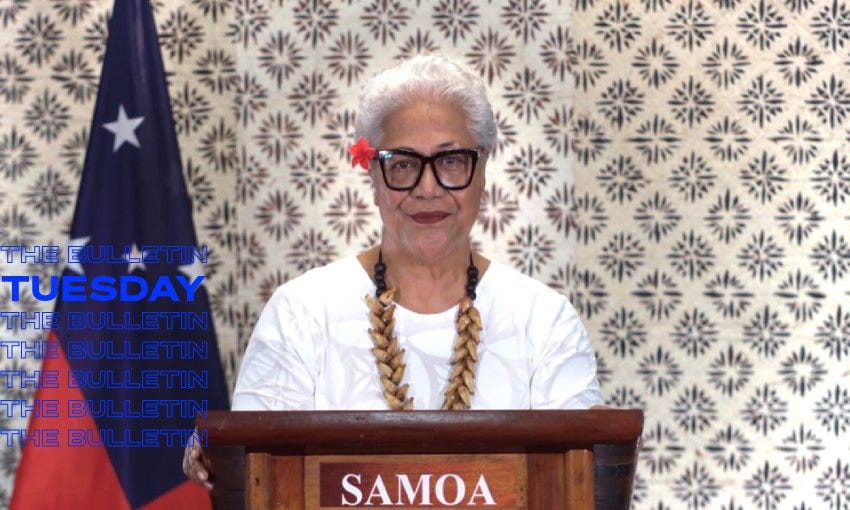Sāmoan PM not just here to talk China
Security issues in the Indo-Pacific region have dominated commentary about the area but Fiame Naomi Mataʻafa will also have other priorities when she meets Ardern today
Mōrena and welcome to The Bulletin for Tuesday, June 14, by Anna Rawhiti-Connell. Presented in partnership with Z Energy.
In today’s edition: “minor” cabinet reshuffle a bit major; Fletcher’s to meet on Gib supply crisis; job ads outpace applications; but first, Sāmoan PM to meets Ardern today.
Sāmoan prime minister Fiame Naomi Mataʻafa (Photo RNZ/ Supplied/SPREP)
Beyond security concerns
As the neck-in-neck historic Sāmoan election result came through last April, media outlets here got a bit distracted by the death of Prince Philip. Sāmoa’s first female prime minister, Fiame Naomi Mataʻafa, was sworn in May last year. Mataʻafa is in New Zealand for the first time since then and will meet with Jacinda Ardern today. No doubt security concerns in the Pacific region will be on the agenda but some recent commentary has had a tone implying Pacific island countries are like kids we left alone with a box of matches. It has distracted from other issues that matter to Mataʻafa and Sāmoa. In a recent press briefing with Australian foreign minister Penny Wong, Mataʻafa herself politely side-eyed the focus on China's presence in the region.
Climate change a threat to the region
Looking at Mataʻafa’s agenda while she is here and what was discussed with Wong, it’s obvious climate change will be a focus. Recent comments from other Pacific leaders suggest they regard climate change as a bigger threat to the region than geo-political conflict. A report from the V20, a coalition of countries especially vulnerable to climate change, found that climate change wiped out one-fifth of the wealth of poorer countries in the group. Mataʻafa is meeting with a host of ministers including climate change minister James Shaw, foreign affairs minister Nanaia Mahuta and associate minister for immgration Phil Twyford.
Focus on improving conditions for RSE workers
Mataʻafa is also visiting Recognised Seasonal Employers (RSE) worker accommodation in the Hawkes Bay. RSE workers were a topic of conversation with Australian foreign minister Penny Wong at their meeting in early June. In New Zealand, the Green party has recently called for an overhaul of the scheme after submissions to a select committee inquiry prompted concerns about exploitation. New legislation was tabled in the Sāmoa parliament in April aimed at improving working conditions for seasonal workers in Australia and New Zealand. Writing on fair pay agreements (FPA), Rebecca Macfie reports that FPAs are a way to protect vulnerable Pasifika RSE workers who “can’t possibly engage in effective and fair individual bargaining or collective bargaining under the Employment Relations Act.”
Anti-money laundering law causing problems
There's another issue that’s been very well covered by Stuff’s Dileepa Fonseka. I don't know if it will make the agenda for Mataʻafa’s visit but it’s worth mentioning and is related to the importance of RSE workers to the economies of Pacific countries. Remittances, or the transferring of money from here to the Pacific has been made a lot harder because of our anti-money laundering (AML) legislation. Numbers from the World Bank in 2014 show remittances from New Zealand made up more than 15% of Samoa’s GDP. Fonseka writes that critics of our AML legislation say the rules have had little impact on transnational crime and have increased costs for people in the Pacific Islands for whom every extra cent paid in transaction fees matters.
Business Is Boring, in proud partnership with Spark Lab:
It was an idea cooked up by Ollie Morrison during a Covid lockdown, creating South Asian-inspired pies. Now Roti Bros can be found at Farro supermarkets, Auckland’s Commercial Bay and in pop-ups around the country. Morrison and co-founder Logan Stevens have aspirations to bring their South Asian-inspired curry pies to the world, and joined Simon Pound on Business is Boring to talk about turning the initial idea for Roti Bros into a successful business, and what makes their roti pies taste so damn good. Listen to the podcast here.
The not very minor cabinet reshuffle
Billed as “minor” yesterday morning, the prime minister’s cabinet reshuffle got upgraded to a bit major after news of the changes broke in the afternoon. As an indication of its scope, I, a news gannet, could not easily rattle off the details to people last night. Toby Manhire has helpfully itemised the movements which include Poto Williams losing the police portfolio to Chris Fixitkins Hipkins. Kris Faafoi is leaving parliament entirely to spend more time with his family. His justice portfolio goes to Kiritapu Allan, while Willie Jackson picks up Broadcasting. Immigration goes to Michael Wood. The Herald’s Thomas Coughlan (paywalled) described the reshuffle as “mid level” saying the appointment of Hipkins to police minister “was an important signal to the electorate that five years into government, Ardern has not become so distant she does not hear public concerns.”
Fletcher’s to meet on Gib supply issue
Gib has become a kind of three-lettered shorthand to sum up the challenges of the construction industry in these not quite post-pandemic times. There is a nation-wide shortage of Gib and Winstone Wallboards (owned by Fletcher Building) has 94% of the New Zealand plasterboard market. Last week, Kiwisaver provider Simplicity took issue with Fletcher Building’s stronghold on the crucial building supply, cancelled all contracts to purchase Gib from the company and is instead importing foreign plasterboard. Simplicity says it’s cheaper and quicker. In a development, Simplicity will meet with Fletcher Building and the NZ Shareholders Association to discuss the shortage this week. Simplicity owns 0.8% of Fletcher Building through its KiwiSaver schemes and is concerned about the supply issue’s impact on investor returns.
A message from senior writer Alex Casey:
Earlier in the year we published When the Lessons End, an in-depth examination of one woman’s experience at the hands of her private music teacher, and the impact it had on the rest of her life. Stories like these take months of rigorous reporting, travel costs and hefty legal fees to get to publication stage, all of which was only possible thanks to our members.
I feel so lucky to work for an organisation that encourages long-form investigative journalism, but the reality is that this work is impossible without the ongoing support of our readers. If you can, please support our work by donating today.
Labour shortage continues
New figures from job site Seek point to the continuing labour shortage in New Zealand. The number of job ads posted to their site rose 3% in May, 15% higher than a year ago. Job applications have fallen by 4%. Seek’s Rob Clark said there had been an increase in the number of full-time roles being advertised, compared to part-time, casual and temporary roles. Clark puts it down to companies wanting to retain people who might have otherwise been casual workers in the past. He also noted that tourism businesses were back to hiring again but were struggling to find staff in the lead up to what will hopefully be a busy winter. Hopes were pinned on the final round of border reopenings to fill the gaps.
Got some feedback about The Bulletin, or anything in the news? Get in touch with me at thebulletin@thespinoff.co.nz
We wouldn’t just dig up a mountain… would we? Toby Morris' new Side Eye comic looks at Tāmaki Makaurau’s volcanoes and how we reckon with the past. Mad Chapman marvels at the Sydney Morning Herald having the audacity to complain about Rebel Wilson "gazumping" the paper's attempts to out her. Ben Gracewood explains why claims of "sentient" AI may be slightly exaggerated.
More nerve-wracking test cricket
The second test between New Zealand and England is hanging in the balance. The fourth day ended with the Black Caps 224-7 and a lead of 238 over England. Daryl Mitchell was 32 not out at stumps, while Matt Henry was on 8. As Stuff’s David Long writes it's up to them and the remaining batting order to either ensure a win or at least avoid entering the record books as this being the biggest first innings score by the Black Caps in a test they’ve eventually lost.
Sponge cities
Extremely pertinent based on the weather of late, this is an interesting read from the Guardian on one approach to climate change adaptation. China’s “sponge cities” are an initiative that aims to make urban regions better able to absorb rainfall and release it when needed.











